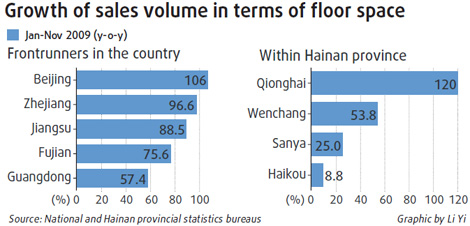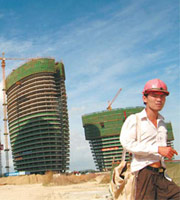Top Biz News
Knowing where to buy
By Hu Yuanyuan (China Daily)
Updated: 2010-01-04 08:04
 |
Large Medium Small |

Island resort province is a hot spot for investors and pensioners
The question on many Chinese people's lips is where to buy a home after property prices in the country's key cities almost doubled last year. According to Xie Ling, the hot spot is Hainan, China's southernmost province.
Xie, an editor in his 40s, has just bought an apartment in Sanya, Hainan province, at a unit price of 14,000 yuan per sq m. To her surprise, the developer raised the sales price by 1,000 yuan per sq m just one week after her purchase.
"I intend to live there after I retire and use it as a hedge against inflation, but such a quick appreciation in value exceeded my expectations," said Xie, who currently lives in Beijing.
Hainan, a 35,000 sq kilometer island province, is typical of the country's real estate price boom. It was the scene of a property bubble in the early 1990s which cost the local economy dearly, but now it is back in favor.
|
A man practices the relaxing art of tai chi while in the background a property boom on Hainan prompts fears of another bubble. [CFP] |
The local authorities want to turn the province, which boasts lavish sub-tropical sunshine and beaches, into an international tourism paradise, with the offering of a visa-free policy for overseas visitors and duty-free shopping venues for Chinese citizens. Li Baiqing, vice major of Sanya, the island's top tourism destination, told China Daily the plan has been submitted to the State Council for approval and will hopefully be passed early this year.
Many early birds have begun betting on its future, creating a boom in both investment in and consumption of local property.
Industry insiders estimate that more than 100 property
developers from all over the country have entered the province, with their total investment exceeding 100 billion yuan so far.
According to the National Bureau of Statistics, real estate investment accounted for 31 percent of Hainan's fixed asset investment in the first three quarters of 2009, much higher than the country's average of 20 percent. The investment into Hainan's residential sector jumped by 58.5 percent year-on-year to 20 billion yuan, with the growth rate ranking second in the country.
In November, Haikou, the provincial capital, became the country leader in home price growth with a 4.7 percent month-on-month rise. In Sanya, the average property price has jumped to 14,751 yuan per sq m in September from 9,526 yuan in June.
Canadian Chinese Linda Wang is typical of those who have bought homes in Hainan as an investment instead of living in them. She bought four apartments alone in Wenchang in November. She also led a home purchase delegation from Canada to shop for property in the small city.
"Compared with Beijing, Shanghai and Shenzhen, where property prices have soared in 2009, Hainan prices are still low with fewer investment risks and higher profit margin potentials," she said.
Liu Liangjun, a manager at www.hainan-live.com, the country's largest platform for selling Hainan property, said that some buyers from other provinces even remitted money to the property developer of a project before it was built, as the price in Hainan now changes monthly or even weekly.
To some, such a rosy picture is rekindling memories of the situation nearly two decades ago. Then, more than 20,000 companies in real property development, sales or brokerages were in business in the island with a population of around 8 million. Local home prices more than quadrupled from 1990 to 1993. The bubble was pricked in mid-1993 when the central government tightened policies, leaving the island with numerous abandoned construction sites and more than 30 billion yuan in distressed loans.
Today, the heat of the property market is visible as soon as visitors step into the arrivals lounge of Haikou's airport, where huge billboards featuring local properties are vying to catch buyers' attention. What they unite in saying is more or less the same: this is the best place to spend your holiday and the rest of your life.
Zhang Wei, a taxi driver in Sanya who has lived more than 20 years on the island, said the atmosphere is similar to that of two decades ago.
"If you stroll around the beach in Sanya at night, you will find that most of those sold apartments are unlit," said Zhang. "Local residents can hardly afford to buy an apartment now."
Yao Huifen, general manager of Hainan Real Estate Co Ltd, lived through the crisis in the early 1990s. She said she was seeing no obvious bubble yet.
"The economic fundamentals of Hainan and the country today are simply incomparable with two decades ago. Investors are also much more rational," she said.
Yao's viewpoint was echoed by Huang Guohua, chief manager of the Asset Administration Department of China Construction Bank (Hainan Branch). He dealt with the bad loans arising from the burst of the Hainan property bubble in 1993.
"Compared with two decades ago, banks now have better risk control schemes. The China Banking Regulatory Commission also has stricter supervision over potential risks," Huang said.
But Yao admitted the flood of investors from outside the province was a cause for concern. A recent survey by Midland Realty showed that more than 50 percent of property purchases in the major cities were for investment purposes. The money from outside has shored up the price and fueled worries about a bubble.
Yu Zijian, deputy general manager of R&F Hainan Real Estate Development Co Ltd, said more than 90 percent of buyers of their project were outsiders, coming particularly from affluent regions including Beijing, Shanghai, Zhejiang, Chongqing, Chengdu and the Northeastern area.
|
A construction site on Phoenix Island, a luxury property in Sanya, Hainan. This is a fragment of the island province's ambition to become China's answer to Dubai. [CFP] |
"Frankly speaking, for such a high unit price, there is not much room for value appreciation, but it seems that those investors just want to find a place to put their money," said Zhou Tao, a sales consultant with Phoenix Island.
His thoughts could be right. Behind the property price surge in China's major cities is a rapid growing rich stratum with ballooning wealth and a growing fear of imminent inflation. Also, the economy is awash with cash after banks issued an unprecedented flood of loans to help combat the financial crisis.
According to a report jointly released by Merrill Lynch Global Wealth Management and Capgemini, China has surpassed the United Kingdom to become the world's fourth-largest high-net-worth individuals (HNWI) market. HNWI refers to people with net assets of no less than $1 million, excluding their primary residence and consumables. In China, there were an estimated 364,000 HNWIs at the end of 2008, and their combined wealth stood at $1.7 trillion.
With few investment channels in China, property is an alluring target. A recent survey by the central bank shows that property is Chinese citizens' first choice for wealth management, followed by funds and stocks.
"The property price in China's first tier cities has been unreasonable, making those who really need an apartment to live beyond affordability. For rich guys, housing has been a way of saving," said Grant Ji, director of Savills (Beijing), a UK-based real estate service provider.
"Though property investment is an ideal channel to fight against inflation, an unreasonably high price will also make the investment a failure once the market collapses," he added.
Just a few days after the cabinet announced its plan to curb "excessive" growth of property prices in some cities, five ministers set a new threshold for land purchase, requiring property developers to pay 50 percent of the total price as the downpayment. Meanwhile, the Ministry of Housing and Urban-Rural Development said it would construct 1.8 million low-rent houses and 1.3 million economically affordable homes in 2010 for low-income families.
The policy objective of the central government is to deflate potential bubbles and send early warning signals to investors and property developers, said Michael Wu, director of the Fitch Rating Asia Pacific corporates team.
"Without more substantial tightening policy measures, market sentiment should be relatively stable, and property prices are likely to move within a tight range. However, a strong performance in sales and profit margins is unlikely to recur in 2010," he added.















